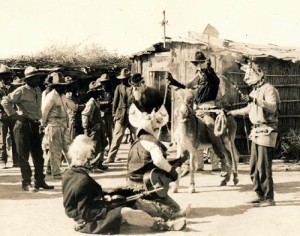It was a treat to have Theresa May, the author of Salmon Is Everything, join our class on Thursday. Her presence stimulated great discussion, and we learned about the steps she took to write the play. From what I gathered, it took a lot of time and research to come up with the content. Through rehearsal, editing, and discussion with locals, May was able to produce a great play that has now become a piece of history.
Many of the locals were skeptical that her work on the play was just her effort as an environmentalist to help a cause in the moment. They did not think that she would dedicate so much time to the environmental issue. May has thrown herself into the lives and culture of the Klamath people in order to ensure that the play accurately portrays the characters thoughts and feelings about the issue.


